How Latin American feminist theory can help battle toxic masculinity
Elisabeth Goemans, a PhD candidate in Spanish, Portuguese and Latin American Studies, tells us about writing an opinion piece for the newspaper De Standaard, and what happened next.
Elisabeth Goemans is a third year PhD student researching the representation of gender and violence in the English translations of contemporary Argentinian women's writing.

She holds a number of degrees from KU Leuven in Belgium, including a Masters in literary translation. Her work is situated at a crossroads between literary studies, translation studies, and Latin American studies.
In June 2023, Elisabeth published an opinion piece on male violence in Belgium’s De Standaard, generating over five pages of comments on the paper's website, a counter opinion piece, and numerous posts on social platforms.
We asked her what it was like to publish outside of academia and in what way studying for a PhD has helped her handle the debate her piece ignited.
Resonating across borders
In her research, which is co-supervised by Iona Macintyre and Fiona Mackintosh, Elisabeth is looking at the work of women writers such as Mariana Enríquez (Things We Lost in the Fire; Our Share of Night), Selva Almada (Dead Girls; Brickmakers), and Dolores Reyes (Eartheater).
“Right now” she says “there are many interesting women writers in Latin America and specifically Argentina, and both academic circles and the broader reading public are fascinated by them.”
“Their gender violence narratives take place in a specific cultural context, but still resonate with people outside of Latin America, many of whom read them in translation.”
“I think the dynamics of translation, the positioning of authors in the book market, and the treatment of politically charged themes like gender violence and feminism are deserving of our attention.”
Backlash and beyond
The feminist framework for Elisabeth’s PhD draws on Rita Segato’s theory of a pedagogy of cruelty, wherein violence against women is symptomatic of society, and men are taught that it is normal.
Her opinion piece, How are we going to raise our sons?, was published in June 2023 following weeks of media reporting on masculine violence in Belgium that was, as Elisabeth says, “framed time and time again as unfortunate, isolated cases – no-one was addressing the systemic issue that linked these deadly incidents.”
“I received a lot of backlash”, she says. “More than I anticipated. Of course I knew it was a somewhat sensitive topic. Unfortunately, [De Standaard’s] comment section and Twitter turned into their own violent corners of the internet.”
Asked in what ways, if any, her PhD prepared her for dealing with the response to the article, Elisabeth says “it helped me to put the criticism into perspective, in the sense that no one accused me of misunderstanding Rita Segato. Moreover, the aggressive and irrational reactions proved my point that we have not taught men to properly deal with their emotions.”
Drawn to Edinburgh
Elisabeth was drawn to Edinburgh from Leuven by the chance to work with her supervisors, Iona and Fiona, who she points out “from the first video call, showed genuine interest in both my research and wellbeing (and that hasn't changed!).”
“Although [at that point] I had never actually been to Edinburgh”, she continues, “I thought it would be the ideal city for me: the coziness, the fact that books and literature are everywhere, and the proximity of nature.”
Since she joined the School of Literatures, Languages and Cultures (LLC), she has been highly active in PhD life. She is the Co-founder of Women's Voices in Hispanic and Lusophone fiction, an LLC reading group discussing contemporary Spanish, Portuguese, and Latin American literature in translation, and was the School’s Postgraduate Research student representative for 2022 to 2023.
She has previously been an Assistant Editor of the University of Edinburgh postgraduate journal FORUM, Issue 34 of which is out now.
Are you interested in Spanish, Portuguese and Latin American Studies?
Founded in 1919, LLC has one of the best-established departments of Spanish, Portuguese and Latin American Studies (SPLAS) in the UK. We offer a wide range of undergraduate and postgraduate programmes, including teaching and supervision in Basque, Catalan, Latin American, Portuguese and Spanish studies. If you are interested in postgraduate research, we can supervise students on one-year Masters by Research programmes, and on PhDs (typically three years full-time; six years part-time).
Find out more about postgraduate study in SPLAS at Edinburgh
Related links
Find out more about FORUM and read Issue 34

